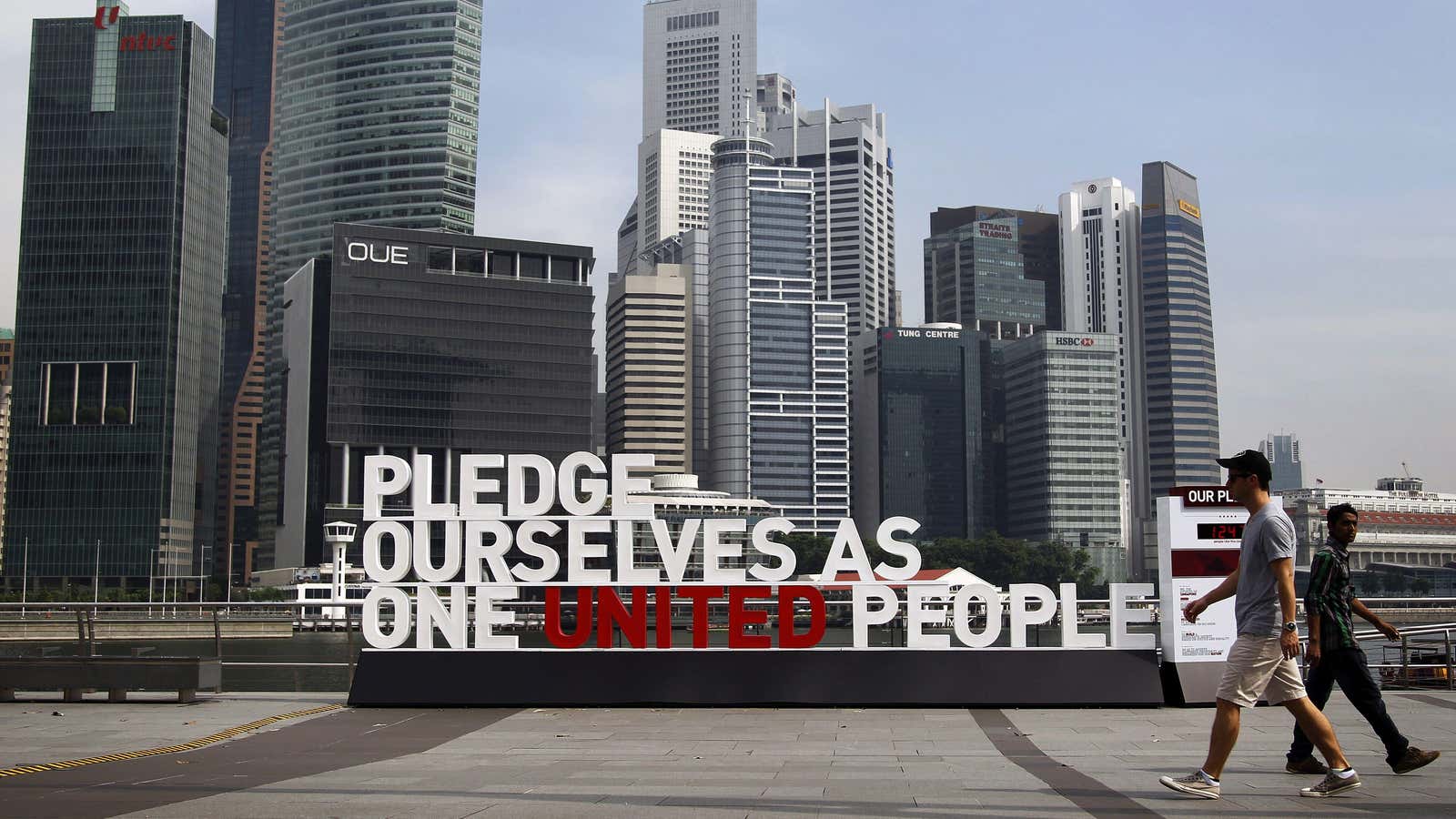At a time when right-wing nationalism is seeing a resurgence globally, Singapore’s move to ensure minority representation may seem almost progressive in comparison.
The city-state could soon have its first female Muslim president, after the government rubber-stamped changes last week that would see only the country’s Malay, Muslim minority—making up about 15% of its 3.9 million resident citizens—eligible to stand at September’s election to choose its head of state, a largely ceremonial role.
But since Singapore gained independence from Malaysia in 1965, the ruling People’s Action Party (PAP) has in fact relied on a plethora of race-based innovations to maintain racial harmony between its majority Chinese population, and the minority Malay-Muslim and Indian ethnic groups. The latest move to designate that the president must be a Muslim is seen as another one of these measures.
“The government believes they have to engineer multiracialism,” said Eugene Tan, associate professor of law at Singapore Management University. “They regard the election of a minority as head of state as an important testament of Singapore’s nation-building journey. Attaining that end justifies the means.”
To maintain racial harmony, Singapore has implemented a range of policies, including racial quotas in public housing to ostensibly prevent the formation of ethnic ghettos. In an electoral innovation known as “Group Representation Constituencies,” teams of candidates, instead of individuals, stand in legislative elections—and each team must have at least one member from a minority community. Religious and racial hate speech may also be charged under the Sedition Act.
A special constitution commission recommended last October that the presidential post would be “reserved” for a particular racial group—Chinese, Malay, Indian, or others—if that group has not occupied the presidential office for five consecutive terms or the equivalent of up to 30 years. Singapore’s last Malay president was also its first: Yusof Ishak, who died while serving his third term in 1970 and whose image adorns the country’s dollar bills. Since then, two Indians, one Eurasian (a person of mixed European and Asian ethnicity), and three Chinese, including the current president, have held the post.
“The president represents all Singaporeans… We must have a minority president from time to time… a Malay one, an Indian, or other minority, and then people see that, ‘Yes, this is my country. Someone like me can become the head of state, can represent the country,'” said prime minister Lee Hsien Loong in an interview last September.
At the reading before the amendment was officially passed into law, Chan Chun Sing, a minister in the prime minister’s office, accidentally twice referred to Halimah Yacob, the current Speaker of the House, as “Madam President.” Though she hasn’t indicated her plan to contest the presidential election, speculation is rife that Yacob might be the ruling party’s anointed candidate.
But the change has sparked some unhappiness among minorities who see what is effectively affirmative action as a step backward.
“Like it or not, it risks being read as a vote of no confidence in the community,” Nizam Idris, an ethnic Malay who works at Australian bank Macquarie as the head of market strategy, wrote in an op-ed for the Straits Times in November when the proposal was first floated. “It makes me wonder what happened to our belief in boosting self-reliance and self-respect through doing away with affirmative action and race-based state aid in education and career progression.”
Still, a survey conducted jointly last year by Channel News Asia and the Institute of Policy Studies, a government think tank, suggests the PAP might just be trying to work around deeply entrenched racial biases—60% of Singapore’s Chinese population said they would accept an Indian prime minister or president, while just over half would accept a Malay prime minister or president. The approval levels for a Chinese prime minister and president are at 98% and 96%, respectively.
In the face of such prejudice, Idris wrote that most Malays would not reject the chance to see a president from their community if it was “offered on a platter.” But, he added:
What would be even more satisfying is a hard-fought campaign leading to the election of a Malay president who deserves the position based on the famously Singaporean values of grit and merit. The changes to the Constitution… may have inadvertently denied me and other members of Singapore’s minority communities the pleasure of seeing that happen.
